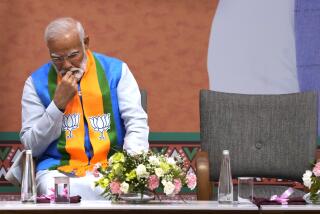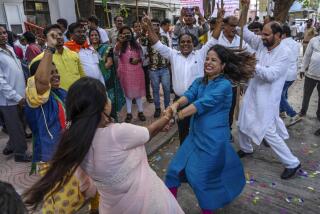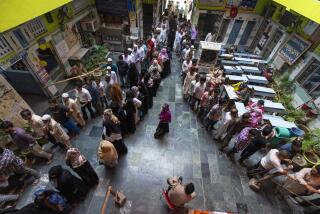Gandhi Appears to Have Beaten Back Challenge : But He Has Lost Popular Appeal in Surviving Scandals and Political Setbacks
- Share via
NEW DELHI — Despite charges of corruption in his government and a humiliating series of setbacks for his party in state elections, Prime Minister Rajiv Gandhi appears to have defeated a challenge to his leadership.
“He has emerged from financial scandals, election defeats, constitutional crises and dissension within his party as the unchallenged leader of India,” a loyal aide said the other day. “I can’t think of a more magnificent plan to pull him down than what has happened over the past three months. But at the end, after all the dust had cleared, Rajiv Gandhi was still standing.”
Clearly, Gandhi no longer has the overwhelming popular support he had after the assassination of his mother, Prime Minister Indira Gandhi, in 1984. Most political analysts agree that if a parliamentary election were held today, he would probably lose.
Handpicked Candidate
Barring a political catastrophe, there will be no parliamentary election until 1989, but there will be an election today for president, and virtually no one doubts that Gandhi’s handpicked candidate will win.
This probably ensures that Gandhi will complete the last 2 1/2 years of his five-year term. And it will give him plenty of time, his supporters say, to recover from the decline in his popular support.
Gandhi’s party, the Congress-I (“I,” for Indira, was added in 1978, when she broke with the traditional Congress Party), has long been associated with corruption and inefficiency. Most recently, it has been stung by charges that party members took kickbacks from foreign defense contractors.
Gandhi himself, laconic and aloof, with little of the popular appeal his mother had, is perceived as a protector of his middle-class friends.
Withstood Political Attack
“From being viewed as a benevolent monarch who naturally spoke a different idiom as befits royalty, but who had the good of his subjects at heart, more and more . . . the prime minister (is) regarded as a callous ruler who neglected his kingdom while recklessly squandering his meager revenue on his fads and his friends,” wrote the Calcutta-based editor of the Statesman newspaper, Sunanda K. Datta-Ray.
Even his strongest supporters concede that the 43-year-old prime minister, who is not only the son of Indira Gandhi but the grandson of India’s first prime minister, Jawaharlal Nehru, barely survived a bold political move to remove him from power.
Details are only now coming to light, but it seems clear that for a few days last month, after the Congress-I’s defeat in state elections in Haryana, the Nehru-Gandhi dynasty was in jeopardy.
Political analysts have described it in the press as the ruling family’s lowest moment since Indira Gandhi was defeated in the election of 1977 and forced to the political sidelines until her dramatic return in 1980.
Subtlety and Conspiracy
The latest challenge, involving all the subtlety and conspiracy that Indian democracy can muster, had its origins in the planning for Monday’s presidential election.
The vote will be indirect, involving not the people but members of Parliament and the state legislatures sitting as an electoral college. The president is a largely ceremonial figure subordinate to the prime minister and the Cabinet, but opposition leaders and rebels in the Congress-I saw the election as an opportunity to show that Gandhi had lost control of the Lok Sabha, the lower house of Parliament. Congress-I controls 402 of its 544 seats.
A move was made to persuade President Zail Singh, who had feuded with Gandhi--he said he was not being informed of government decisions--to declare himself a candidate for reelection. Doing so would be a direct slap at Gandhi, who had already named Vice President Ramaswamy Venkataraman as his choice.
Singh, 71, who had been nominated for the presidency by Indira Gandhi in 1982, did not need much persuading. For months, he had been hinting that he would be interested in a second term under the right circumstances.
Old-Line Support
Singh was supported by a number of older party leaders--among them Vidya Charan Shukla, Jagannath Mishra, Arif Mohammed Khan, Kamlapati Tripathi and a Gandhi cousin, Arun Nehru, who considered themselves Indira loyalists who had been stripped of power by Rajiv Gandhi as he sought to reconstruct the party in his image.
A more practical consideration in Singh’s decision was his personal safety. In the massive presidential palace--once the residence of the British viceroy--he would continue to be relatively safe. But outside, he was a target for Sikh separatists who regard him as a traitor to his religion for siding with the government in 1984, when troops raided the Golden Temple in Amritsar, the Sikhs’ holiest place.
According to sources close to the situation, Singh put off a decision until after the June 17 state elections in Haryana, which were looked upon as a test of Gandhi’s leadership. If Congress-I should lose, Singh reportedly told associates, he would be a candidate for reelection.
The Congress-I lost by a decisive margin, winning only five of the 90 legislative seats at issue. As a party worker put it, “We were thrashed.”
Campaign Plotted
Leaders in the main opposition parties--Lok Dal and Bharatiya Janata, which had been successful in Haryana; Janata, which ruled in New Delhi from 1977 to 1980; Telegu Desam, from the state of Andhra Pradesh; the Communist Party of India and the Communist Party of India-Marxist--agreed to meet in New Delhi to plot a campaign against Gandhi.
Because none of these parties had cast a national figure, they decided to find a dissatisfied public figure in the Congress-I and to try to force a split. The presidential election seemed to present the best opportunity, because it was to be carried out by secret ballot. By law, members of Parliament may not break with their parties unless more than one-third of their colleagues do so, but obviously this does not apply to secret ballots.
So if enough members of the Congress-I Party in Parliament and in the state legislatures could be persuaded to vote against the party candidate for president, the theory went, it would amount to a vote of no confidence in the prime minister, and Gandhi would be forced to resign.
The electoral college is made up of the 774 members of Parliament and the 3,891 members of the 24 state legislatures, but the votes are weighted. The vote of a member of Parliament is equal to roughly 3 1/2 votes of state legislators. Even so, the opposition believed that enough Congress-I members could be counted on to abandon Gandhi and defeat his candidate.
Hesitated, Then Backed Off
On June 20 and 21, when the unified opposition was deciding on a candidate to oppose Gandhi’s man, delegation after delegation called at the presidential palace to urge Singh to run. Other visitors included prominent astrologers, who are customarily consulted by Indian politicians.
According to sources on Singh’s staff, he was leaning toward announcing his candidacy but was holding back for the following reasons:
-- No one could tell him exactly how many legislators would bolt the Congress-I and give their votes to him.
-- Two of the key Congress-I rebels, former Defense Minister V.P. Singh and Arun Nehru, Gandhi’s cousin, had failed to come out publicly against the prime minister. Before he was dismissed by Gandhi in April, V.P. Singh had initiated an investigation of defense kickbacks with West German and Swedish contractors that had embarrassed Gandhi’s associates.
-- The Communists had pulled out of the unified opposition and were now supporting a candidate of their own.
In the end, Zail Singh chose not to be a candidate. However, he summoned Gandhi to the palace and reportedly told him that he wanted a secure place to live after leaving office, a place in New Delhi befitting a retired ruler. He did not want to be exiled to some place--Bangalore had been mentioned--out of the political mainstream.
Gandhi is said to have assured Singh that his wish would be granted. Then Singh spoke the words that Gandhi had come to hear: “I will not contest.”
The most serious challenge to the prime minister’s rule was past. The opposition nominated a relatively obscure political figure, Krishna Iyer, to oppose Gandhi’s candidate for president. Barring a catastrophe, Vice President Venkataraman, Gandhi’s man, is expected to win today’s election.
More to Read
Sign up for Essential California
The most important California stories and recommendations in your inbox every morning.
You may occasionally receive promotional content from the Los Angeles Times.













